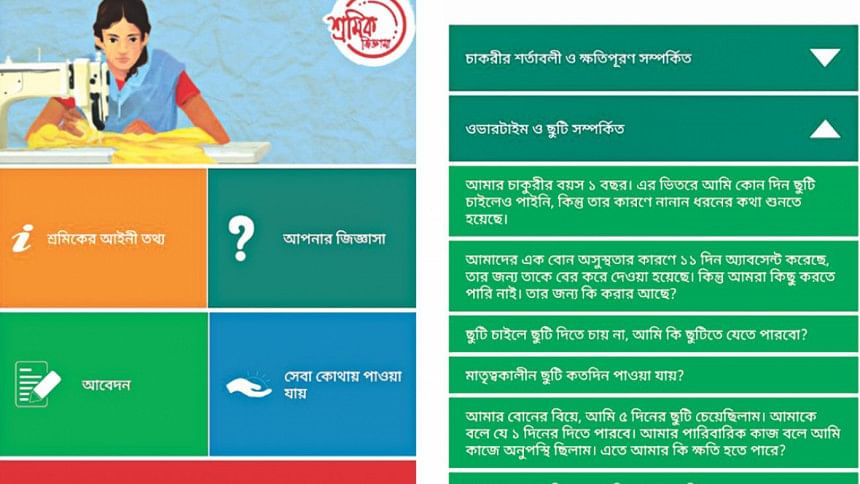Sromik Jigyasha: Legal aid at RMG workers' fingertips
A ready-made garment worker, Rekha was informed that some of her colleagues had been fired from the factory in Tejgaon without any prior notice. They were asked to leave without salaries.
Though she was not one of them, she sought legal help on their behalf through a mobile application called “Sromik Jigyasha”.
Rekha was later advised to meet officials of Bangladesh Legal Aid and Services Trust (BLAST) directly, with relevant documents. With the help of a paralegal officer, she along with other workers sent a legal notice to the authority of the garment industry. The result was quick; those who had been fired were handed their due salaries within a few days.

“If I need any help regarding legal issues or violence, I always get help via the app,” said Rekha.
BLAST launched Sromik Jigyasha last year. It was funded by C&A Foundation, an organisation working to ensure better working environment for garment workers.
The platform is accessible in both English and Bangla, where a team of BLAST lawyers and counsellors respond to queries. The app also provides RMG workers with information related to labour law and available health services. Users can make calls directly to the designated persons or send text messages.
On receiving a query, a paralegal may submit that application to a lawyer if the applicant requires more than just legal advice. Identity of the users would remain protected. Any garment worker can register by signing in using their mobile number.
About 65 percent of garment workers use smart phones, so they can easily use an app for legal help, said Tayebur Rahman, manager of WEARS Project at BLAST. The app helps with legal support following violence against women, health services, and ambulance facilities.
Over 10,000 users have already logged in to Sromik Jigyasha app. Most of them have asked questions on workers' welfare benefits, work hours and leave entitlement. They also wanted to know about legal remedies to sexual harassment, wage disparities, and overtime.
Earlier, RMG workers had limited access to information on law, said Tayebur, adding that the app was developed to ensure that no worker would be deprived of their rights.
Khondaker Ali Amjaad, mediation officer of BLAST, told the Daily Star, “We receive complaints through the app on dues or compensation of RMG workers who were forced to leave. But recently we noticed that there are many cases of sexual harassment. The most common complaint is that supervisors inappropriately touch female workers.”
Besides, female workers have queries about maternity leave and payment.
Labour activist Kalpona Akter told The Daily Star, the app is easily accessible and user-friendly, but it should expand to other legal aid organisations to help more workers on a larger scale.

 For all latest news, follow The Daily Star's Google News channel.
For all latest news, follow The Daily Star's Google News channel. 



Comments